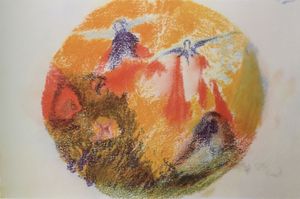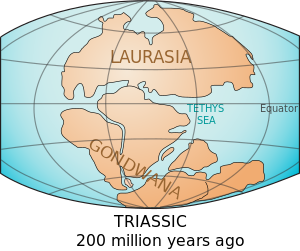Atlantis


The Atlantean age is the fourth of the seven main ages into which the present physical state of form of the Earth is divided. According to obsolete theosophical tradition, this main age is also called the fourth root race[1]. At that time, according to theosophical view, man lived predominantly on the Atlantic continent or island, called Atlantis (Greek: Ἀτλαντὶς νῆσος Atlantìs nēsos "Island of Atlas"), which according to Rudolf Steiner was located in the northern Atlantic Ocean between present-day Europe and America. The term "Atlantis" is considered scientifically outdated today, but it is essential for understanding Steiner's statements. It is possible that his descriptions refer to fragments of the former large continent of Laurasia.
The Atlantean period was preceded by the Lemurian period, in which man first incarnated on Earth, and is followed by the post-Atlantean period, which is divided into seven cultural epochs, the fifth of which is our present modern era.
Climate and location
According to Rudolf Steiner, the Atlantic period on the geological time scale began approximately with the Cenozoic (Lit.:GA 300a, p. 107), the beginning of which is placed at about 66 million years ago[1]. At that time, the climate was completely different from today. At the beginning it was still very warm. Later, about 2.6 million years ago, the most recent Ice Age began with the glaciation of the North Pole. At the South Pole, the Inland glaciation began 38 million years ago.
The air was saturated with water vapour and filled with fog vapours. About 11,700 years ago, with the subsiding of the Last Glacial Period and the beginning of the Holocene, the Atlantic Era came to an end. It was only at the end of the Atlantean period that the masses of fog began to settle and the sea level rose very rapidly as a result of the rapid warming, so that Atlantis finally sank in a massive flood. Plato still tells of the last remnant of this land, the island of Poseidonis, which is said to have been located westwards from Europe and Africa.
„Our root race, the Aryan[2], is descended from the most highly developed sub-race of the Atlantians, the Ur-Semitic, which last dwelt approximately in the region of present-day Ireland. The island of Poseidonis, mentioned by Plato, can be regarded as the last remnant of the declining Atlantis. Manu, a leading figure of the Atlantians, led the most mature people to the East.“ (Lit.:GA 94, p. 168)
Literature
- Dankmar Bosse: Die gemeinsame Evolution von Erde und Mensch: Entwurf einer Geologie und Paläontologie der lebendigen Erde, Verlag Freies Geistesleben, Stuttgat 2002, ISBN 978-3772515934
- Ignatius Donelly: Atlantis, The Antediluvian World, 1882
- William Scott-Elliot: The Story of Atlantis, 1896
- Andreas Delor: Kampf um Atlantis. Ein Beitrag zur anthroposophischen Atlantis-Diskussion, Info 3 Vlg., Frankfurt a.M. 2004
- Andreas Delor: Atlantis nach neuesten hellsichtigen und wissenschaftlichen Quellen, Bände 1 - 8, Vlg. Ch. Möllmann, Borchen 2011 - 2016 ( http://www.andreas-delor.com/index.php?id=43 )
- Rudolf Steiner: Aus der Akasha-Chronik, GA 11 (1904 - 1908), Kapitel Unsere atlantischen Vorfahren English: rsarchive.org German: pdf pdf(2) html mobi epub archive.org
- Rudolf Steiner: Die okkulten Wahrheiten alter Mythen und Sagen, GA 92 (1999), ISBN 3-7274-0920-7 English: rsarchive.org German: pdf pdf(2) html mobi epub archive.org
- Rudolf Steiner: Grundelemente der Esoterik, GA 93a (1976), Berlin, 16. Oktober 1905
- Rudolf Steiner: Kosmogonie, GA 94 (2001), ISBN 3-7274-0940-1 English: rsarchive.org German: pdf pdf(2) html mobi epub archive.org
- Rudolf Steiner: Die Theosophie des Rosenkreuzers, GA 99 (1985), ISBN 3-7274-0990-8 English: rsarchive.org German: pdf pdf(2) html mobi epub archive.org
- Rudolf Steiner: Menschheitsentwickelung und Christus-Erkenntnis, GA 100 (1981), ISBN 3-7274-1000-0 English: rsarchive.org German: pdf pdf(2) html mobi epub archive.org
- Rudolf Steiner: Mythen und Sagen. Okkulte Zeichen und Symbole, GA 101 (1992), ISBN 3-7274-1010-8 English: rsarchive.org German: pdf pdf(2) html mobi epub archive.org
- Rudolf Steiner: Das Johannes-Evangelium, GA 103 (1995), ISBN 3-7274-1030-2 English: rsarchive.org German: pdf pdf(2) html mobi epub archive.org
- Rudolf Steiner: Welt, Erde und Mensch , GA 105 (1983), ISBN 3-7274-1050-7 English: rsarchive.org German: pdf pdf(2) html mobi epub archive.org
- Rudolf Steiner: Ägyptische Mythen und Mysterien, GA 106 (Dornach 1992), Vortrag vom 4.09.1908
- Rudolf Steiner: Geisteswissenschaftliche Menschenkunde, GA 107 (1988), ISBN 3-7274-1070-1 English: rsarchive.org German: pdf pdf(2) html mobi epub archive.org
- Rudolf Steiner: Die Mission einzelner Volksseelen im Zusammenhang mit der germanisch-nordischen Mythologie, GA 121 (1982), ISBN 3-7274-1210-0 English: rsarchive.org German: pdf pdf(2) html mobi epub archive.org
- Rudolf Steiner: Konferenzen mit den Lehrern der Freien Waldorfschule 1919 bis 1924, GA 300a (1995), ISBN 3-7274-3000-1
- Rudolf Steiner: Die vierte Dimension, GA 324a (1995), ISBN 3-7274-3245-4 English: rsarchive.org German: pdf pdf(2) html mobi epub archive.org
- Rudolf Steiner: Vorträge und Kurse über christlich-religiöses Wirken, V, GA 346 (2001), ISBN 3-7274-3460-0 English: rsarchive.org German: pdf pdf(2) html mobi epub archive.org
 |
References to the work of Rudolf Steiner follow Rudolf Steiner's Collected Works (CW or GA), Rudolf Steiner Verlag, Dornach/Switzerland, unless otherwise stated.
Email: verlag@steinerverlag.com URL: www.steinerverlag.com. Index to the Complete Works of Rudolf Steiner - Aelzina Books A complete list by Volume Number and a full list of known English translations you may also find at Rudolf Steiner's Collected Works Rudolf Steiner Archive - The largest online collection of Rudolf Steiner's books, lectures and articles in English. Rudolf Steiner Audio - Recorded and Read by Dale Brunsvold steinerbooks.org - Anthroposophic Press Inc. (USA) Rudolf Steiner Handbook - Christian Karl's proven standard work for orientation in Rudolf Steiner's Collected Works for free download as PDF. |
References
- ↑ cf. the table in Bosse 2002, p. 57
- ↑ These views of Steiner were in sharp contrast to the racial doctrine advocated by the [[w:Nazis|]], through which they wanted to glorify the Aryans as the supposed "master race". After Rudolf Steiner had already been fiercely opposed by the first representatives of National Socialism during his lifetime, the Anthroposophical Society was banned by Reinhard Heydrich's decree on 1 November 1935 "as a result of the antagonism between the views of the Anthroposophical Society and the nationalist ideas advocated by National Socialism".
